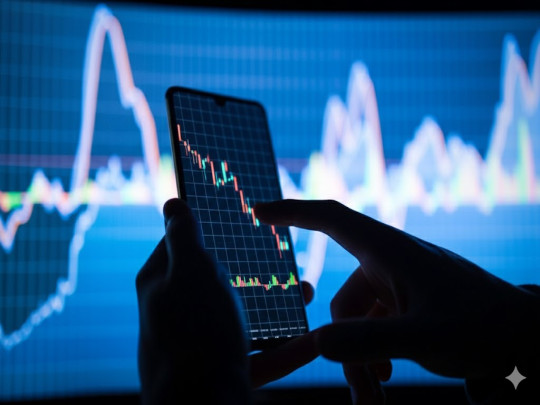Market Update: U.S. Strikes on Iran Spark Global Tension, Defense Stocks Gain, Gold and Oil Hold Steady
Stock Market Update: U.S. airstrikes on Iran's nuclear sites rattle geopolitics but markets stay calm. Oil and energy stocks like Exxon, Marathon, and Conoco rise. Defense names RTX and Northrop tick up. Novo Nordisk slumps, Circle rallies again.

- Early Monday US stock futures were mostly unchanged as markets showed a relatively calm initial reaction to news that the US launched strikes on three Iranian nuclear sites Saturday, formally entering the conflict.
- The surprise US strikes on Saturday drew condemnation from Iran, whose parliament backed closing the Strait of Hormuz, a key oil chokepoint. The US has called on China to intervene to keep the strait open.
- The weekend's escalation follows a week where the S&P 500 posted a second consecutive loss (-0.15%), with markets already under pressure.
- Notable premarket movers Monday included Northern Trust (+6%) rising on a report of merger interest from BNY Mellon. Fiserv (+5%) gained on news of a stablecoin platform launch. Novo Nordisk (-5%) fell on disappointing drug data and its termination of a deal with Hims & Hers, which tumbled ~20%. Energy and Defense stocks were broadly higher on geopolitical news. Tesla (+1%) gained after its robotaxi launch.
- Early June consumer spending data from JPMorgan showed modest but decelerating growth, driven primarily by younger consumers.
- Company news included Circle shares continuing their massive rally Friday (+18%) following the passage of stablecoin legislation. Major health insurers also announced plans to streamline prior authorization.
- Global markets Monday saw Europe trade lower, with European defense stocks notably declining despite the tensions. Asia mostly fell on the US-Iran news, although China-related markets bucked the trend and closed higher.
- Oil prices, which initially jumped on the US strike news, gave up some gains but remain a key focus due to the Iranian threat to close the Strait of Hormuz.
- Market sentiment turned more bearish last week (AAII survey). Investors are now bracing for potential Iranian retaliation to the US strikes, though some analysts believe the fallout will be contained. The PCE inflation report on Friday is also a key focus.
U.S. President Donald Trump on Saturday confirmed that American forces had launched strikes on Iranian nuclear facilities, marking a significant escalation by formally entering Israel’s conflict with its longtime adversary. Secretary of Defense Pete Hegseth declared on Sunday that “Iran’s nuclear ambitions have been obliterated,” a message reinforced by Trump, who used the word “obliteration” to describe the outcome of the attacks. The strikes represent a major policy shift for the president, who had long promised to keep the U.S. out of further entanglements in the Middle East.
Despite the severity of the development, financial markets responded with relative calm. Stock futures were mostly unchanged Monday as investors digested the news of the U.S. entering active warfare in the region. The strikes on three Iranian nuclear sites stoked fears of broader conflict, but those concerns didn’t immediately trigger major sell-offs. Oil prices, while initially higher, gave up gains later in the session, signaling that traders were still waiting to assess Iran’s potential response.
Markets had already been under pressure. The S&P 500 wrapped up last week with a modest loss of 0.15%, marking its second consecutive weekly decline. The Dow Jones Industrial Average managed a slight gain of 0.02%, while the Nasdaq Composite rose 0.2%. The S&P 500 remains about 3% off its record high despite recent volatility, but a deepening war in the Middle East now adds a new layer of risk to an economy already facing strain from President Trump’s aggressive trade policies and a potentially delayed interest rate cutting cycle from the Federal Reserve.
As the world watches for Tehran’s reaction to the U.S. strikes, investors are bracing for what could be a volatile stretch. Any sign of retaliation from Iran could shift the market tone quickly, especially in energy and defense-related sectors. For now, however, markets appear to be cautiously weighing the situation, with uncertainty clouding the path forward.
US Market Previous Day:
Stock futures were little changed on Tuesday as investors awaited further clarity on the status of trade discussions between the U.S. and China. The cautious tone followed a muted session on Wall Street, where market participants remained focused on negotiations between the world’s two largest economies. Talks are expected to resume Tuesday morning, and investors are hoping for signs of progress that could reduce tariff uncertainty and support corporate earnings going forward.
Monday saw modest gains across major indexes, with the S&P 500 edging slightly higher. The index continues to inch closer to its record high, now sitting just 2% below the all-time closing peak set in February. Monday’s advance came after all three major U.S. stock indexes logged their second consecutive weekly gain, suggesting growing optimism despite geopolitical headwinds.
Notably, the S&P 500 ended Friday’s session above the 6,000 mark for the first time since February 21, a psychological milestone that reinforced investor confidence. Market sentiment remains sensitive to developments in trade policy, with traders largely viewing high tariffs as a bargaining chip rather than a permanent fixture, a stance that has supported equity valuations in recent weeks.
US Futures Remain Mixed:
- Dow Jones Industrial Average futures remained flat with decline of 0.02%
- S&P 500 futures showed meagre gains of 0.07%
- Nasdaq Composite futures lead the pack with gains of 0.10%.
Biggest Premarket Movers
- Northern Trust: Shares rose more than 6% following a Wall Street Journal report that rival custodian bank BNY Mellon approached Northern Trust last week to express interest in a potential merger. While the talks are preliminary and may not result in a formal bid, the prospect of a deal between the two financial giants drove investor enthusiasm.
- Fiserv: Shares of the financial services firm jumped almost 5% after it revealed plans to broaden its presence in the digital asset space. Fiserv intends to launch a stablecoin and digital-asset platform for its banking clients and has formed partnerships with Circle and Paypal to advance these efforts. On the news, Circle's shares were up 5%, while Paypal gained almost 1%.
- Novo Nordisk: The pharmaceutical stock plummeted more than 5% after the latest results for its next-generation obesity drug, CagriSema, were viewed as disappointing and suggested no clear advantage over rival Eli Lilly’s Zepbound. Separately, the company announced it has terminated its collaboration with Hims & Hers Health, citing concerns over the telehealth company's compounding and marketing practices. This sent Hims shares down about 20%.
- Estee Lauder: The cosmetics stock popped 2% on the back of an upgrade to "buy" from "hold" by Deutsche Bank. The bank now holds the highest price target on Wall Street among analysts polled by LSEG, signaling strong confidence in the brand.
- DoorDash: The food delivery company moved 2% higher after Raymond James upgraded the stock to "strong buy" from "outperform." The firm stated that the potential for synergies with British food delivery service Deliveroo, which DoorDash is in the process of acquiring, is currently underappreciated by the market.
- Energy stocks: Shares of energy companies were broadly higher after Iran’s parliament backed closing the Strait of Hormuz, a critical trade route for crude oil. This geopolitical tension, along with a subsequent call from the U.S. for China to help keep the strait open, lifted oil and gas stocks. Exxon Mobil rose nearly 2%, while Marathon Petroleum and ConocoPhillips each advanced more than 1%. Companies linked to nuclear energy, like Centrus Energy and Uranium Energy Corp., also gained more than 3% and 1%, respectively.
- Tesla: Shares gained nearly 1% after the electric vehicle maker rolled out its long-awaited robotaxi service in Austin, Texas, over the weekend. Positive initial reviews, including from Wedbush analyst Dan Ives who said a ride in the taxi "exceeded his expectations," contributed to the stock's rise.
- Defense stocks: Defense-related stocks ticked higher on Monday following reports that the United States had struck Iranian nuclear facilities, heightening geopolitical tensions. Shares of RTX and Northrop Grumman each added around 1%, while military tech company Kratos Defense and Security gained 2%.
Israel-Iran War Update:
The United States launched surprise airstrikes on Saturday targeting Iran’s nuclear sites in Fordo, Isfahan, and Natanz. The escalation stunned investors and analysts, many of whom had expected diplomatic efforts to unfold over the coming weeks, especially after President Donald Trump said Thursday he would decide on military action “within the next two weeks.” That phrasing had previously been interpreted as a delaying tactic, given the president’s history of using similar timelines without follow-through.
By striking key nuclear enrichment facilities, the U.S. officially entered Israel’s ongoing war with Iran, marking a significant turning point in the conflict. The attacks drew immediate condemnation from Tehran. Iranian Foreign Minister Abbas Araghchi said Sunday that Iran "reserves all options" to defend its sovereignty and people in response to what he called “outrageous” aggression. In the wake of the strikes, Iran’s parliament approved a measure to close the Strait of Hormuz — a vital maritime chokepoint through which nearly a fifth of global oil passes.
The prospect of closing the Strait of Hormuz has significantly raised geopolitical and market risks. Although the final decision now lies with Iran’s national security council, such a move would mark a major escalation with global economic implications, especially for energy markets. In response, the United States has called on China to intervene diplomatically to prevent Tehran from blocking the strait.
President Trump warned after the strikes that Iran faces “either peace, or tragedy far greater than we have witnessed” since the beginning of hostilities. Iran and Israel continued to exchange strikes over the weekend, further intensifying the conflict. Meanwhile, Foreign Minister Araghchi is expected to visit Russia on Monday to discuss the situation, although analysts suggest Moscow is unlikely to commit significant resources to Iran while it remains entrenched in the war in Ukraine.
Key Economic Data/News:
Consumer spending in June is showing signs of resilience, though there are early indicators of a slowdown, according to JPMorgan. Analyst Richard Shane noted that Chase client data reflects a modest increase in spending compared to May, with total spending growth reaching approximately 2.4% as of June 13. This is slightly above May’s figure of 2.3%. However, Shane pointed out that the pace of growth has been decelerating as the month progresses and as the year-over-year comparison becomes less skewed. On a year-to-date basis, total spending is up 3.09%.
A notable trend highlighted in the data is the generational divergence in spending behavior. Gen Z and millennial consumers are driving a larger share of the increase, with their spending up 5.2% so far in June. This suggests younger cohorts are sustaining consumption levels, even as broader economic conditions potentially begin to cool.
Earnings Season/Company News:
Shares of Circle surged again on Friday following the Senate’s approval of the GENIUS Act, a legislative framework aimed at regulating stablecoins. The stock climbed 18% on continued investor optimism, and is now on track to end the week up more than 77%. Since going public on June 5, Circle’s shares have soared over 500%, buoyed by the company’s central role in digital finance infrastructure.
Coinbase, which benefits directly from Circle’s USDC stablecoin, also gained 3% Friday. The crypto exchange receives 50% of the revenue generated from the interest on USDC reserves and earns 100% of the interest on the USDC held on its own platform. The growing clarity on regulation and booming investor interest in stablecoins have strengthened the outlook for both companies.
Separately, several major U.S. health insurers announced efforts to simplify and expedite the prior authorization process, which has long been criticized for delaying care. Plans include reducing the number of services requiring prior approval by next year and implementing a uniform standard for electronic authorization submissions by 2027. These changes will be adopted by leading insurers such as CVS Health, UnitedHealthcare, Cigna, Humana, and Blue Cross Blue Shield. The industry-wide move is expected to improve efficiency and reduce administrative burdens for healthcare providers.
Global Market Trends:
European markets were moderately lower midday Monday as investors monitored developments in the Middle East following the U.S. strikes on Iranian nuclear sites. Traders also weighed the implications of higher oil prices and the potential for supply disruptions. The pan-European Stoxx 600 index was down 0.3% in mid-session trading. Germany’s DAX fell 0.5%, France’s CAC 40 slipped 0.6%, and Spain’s IBEX 35 eased 0.3%, while the FTSE 100 in London shed 0.1%.
Defense stocks in Europe underperformed, with sharp declines in shares of Germany’s RENK Group, Hensoldt, and Rheinmetall; Sweden’s Saab; Italy’s Leonardo; and France’s Thales. The sell-off came despite heightened geopolitical tensions, and stands in contrast to U.S. defense contractors, which were trading higher in premarket action.
Asia-Pacific markets mostly ended lower on Monday as investors reacted to the U.S. military's strikes on three nuclear facilities in Iran. The move pushed oil prices higher and renewed fears of broader conflict in the region. Japan’s Nikkei 225 dipped 0.13% to 38,354.09, and the broader Topix index slipped 0.36% to 2,761.18. South Korea’s Kospi fell 0.24% to 3,014.47, while the Kosdaq dropped 0.85% to 784.79.
In contrast, China-related markets saw gains. The Hang Seng Index rose 0.67% to 23,689.13, and the CSI 300 index in mainland China added 0.29% to close at 3,857.90. Australia’s S&P/ASX 200 declined 0.36% to 8,474.9 amid rising energy prices and conflict-driven uncertainty.
Debt Market:
European markets were moderately lower midday Monday as investors monitored developments in the Middle East following the U.S. strikes on Iranian nuclear sites. Traders also weighed the implications of higher oil prices and the potential for supply disruptions. The pan-European Stoxx 600 index was down 0.3% in mid-session trading. Germany’s DAX fell 0.5%, France’s CAC 40 slipped 0.6%, and Spain’s IBEX 35 eased 0.3%, while the FTSE 100 in London shed 0.1%.
Defense stocks in Europe underperformed, with sharp declines in shares of Germany’s RENK Group, Hensoldt, and Rheinmetall; Sweden’s Saab; Italy’s Leonardo; and France’s Thales. The sell-off came despite heightened geopolitical tensions, and stands in contrast to U.S. defense contractors, which were trading higher in premarket action.
Asia-Pacific markets mostly ended lower on Monday as investors reacted to the U.S. military's strikes on three nuclear facilities in Iran. The move pushed oil prices higher and renewed fears of broader conflict in the region. Japan’s Nikkei 225 dipped 0.13% to 38,354.09, and the broader Topix index slipped 0.36% to 2,761.18. South Korea’s Kospi fell 0.24% to 3,014.47, while the Kosdaq dropped 0.85% to 784.79.
In contrast, China-related markets saw gains. The Hang Seng Index rose 0.67% to 23,689.13, and the CSI 300 index in mainland China added 0.29% to close at 3,857.90. Australia’s S&P/ASX 200 declined 0.36% to 8,474.9 amid rising energy prices and conflict-driven uncertainty.
Commodities and Other Assets:
Bearishness toward the outlook for stocks over the next six months spiked to 41.4% of respondents after a one-week decline to 33.6% last week, according to the latest weekly survey by the American Association of Individual Investors. The historical average over the length of the survey is 31.0%. Bullish sentiment dropped to 33.2% from 36.7% last week, and remains below the historic average of 37.5% for the 18th week out of the past 19, the AAII said. Roughly 41% of those surveyed said they’d recently become slightly or much more conservative in their investments, while a little less than 10% said they’d become much more aggressive, according to a special question AAII asked this week. The balance reported no change or only modest changes to their investments.
Now traders braced for Iran’s retaliation with the hope that the country would not use an option that could risk a broader conflict and the removal of the regime there. Iran could target U.S. personnel in nearby bases or close the Strait of Hormuz, which would majorly disrupt global oil flows. A prolonged blocking of the strait could boost oil prices above $100 per barrel. In a Sunday interview, with Fox News, U.S. Secretary of State Marco Rubio called for the Chinese government to step in and prevent Iran from closing the key trade route. China remains Iran’s most important oil customer.
The muted reaction in equity markets following the U.S. attacks on Iran shows investors aren’t worried about a shock to the oil market, according to Adam Crisafulli of Vital Knowledge. “While Iran has flirted with closing the Strait of Hormuz, investors aren’t terribly panicked about an oil market calamity, an equanimous view that’s appropriate at this point. Geopolitical risks are undoubtedly elevated in the Middle East right now, but our view remains that the extreme asymmetry of the conflict (with Iran’s military capabilities, and those of its proxy partners, significantly degraded), coupled with Tehran’s relative isolation (with few, if any, allies willing to come to its assistance) and ample global oil supplies, will help keep the fallout contained,” he said.
Where markets go this week will depend on whether the conflict in the Middle East escalates after the U.S.′ involvement. Investors should also keep an eye on economic data. May’s personal consumption expenditures price index, the Federal Reserve’s preferred gauge of inflation, comes out Friday, and will tell if tariffs are starting to heat up inflation.
Market Sentiment:
Bearish sentiment among U.S. individual investors surged this week, reflecting growing caution over equity markets amid geopolitical tensions and economic uncertainty. According to the latest weekly survey from the American Association of Individual Investors (AAII), the percentage of respondents expecting stock prices to decline over the next six months jumped to 41.4% from 33.6% last week. That’s well above the historical average of 31.0%. Meanwhile, bullish sentiment dropped to 33.2% from 36.7%, marking the 18th time in the past 19 weeks it has fallen below the long-term average of 37.5%. A separate AAII question found that around 41% of investors said they had recently become more conservative in their investment approach, while less than 10% had become significantly more aggressive.
Investors are now bracing for potential Iranian retaliation following the U.S. strikes on Iran’s nuclear sites, with hopes that Tehran avoids steps that could trigger a wider regional war or endanger the regime’s stability. One key risk is a possible move by Iran to close the Strait of Hormuz, a chokepoint through which a significant portion of global oil flows. A prolonged disruption there could propel crude prices above $100 per barrel. Over the weekend, U.S. Secretary of State Marco Rubio urged China to pressure Iran not to escalate the conflict. Beijing is Iran’s largest oil buyer and a central player in any potential diplomatic resolution.
Despite the elevated tensions, equity markets have reacted with relative calm. Adam Crisafulli of Vital Knowledge noted that investors are not overly concerned about a disruption to the oil market. He pointed to Iran’s weakened military posture, its lack of strong international support, and currently robust global oil supplies as reasons why markets may be viewing the situation with composure. “Geopolitical risks are undoubtedly elevated in the Middle East right now,” he said, “but the fallout appears likely to remain contained for now.”
Looking ahead, market direction this week will hinge on two factors: how the Iran conflict evolves, and fresh economic data. Investors are especially awaiting Friday’s release of the personal consumption expenditures (PCE) price index, the Federal Reserve’s preferred inflation gauge. It will provide critical insight into whether President Trump’s new tariffs are starting to influence consumer prices, and may shape expectations for rate cuts later this year.



